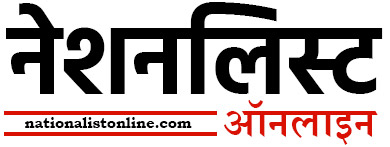SHIV SHAKTI BAKSHI
While the ABVP once again secured a massive mandate in the DUSU election, in JNU the results went in favour of the communists. It was the seventh time in a row that the ABVP won three to four seats in the DUSU election since 2010, and also registered remarkable victories in the students’ union elections held across the states of Rajasthan, Chhattisgarh, Uttarakhand and Jharkhand.
While student politics in JNU has always been around ideological issues, this time ideology gave way to opportunism on the campus. The coming together of SFI and AISA was not only unprincipled but aimed to hoodwink the students by the hollow slogan of ‘Left unity’. The biggest mockery was the fact that AISF, to which outgoing JNUSU President Kanhaiya Kumar belongs, failed to find a suitable candidate for the election.
The JNUSU poll held in the context of some larger issues which raised some serious questions about the kind of student politics allowed on the campus. The unacceptable activities of the communists on the campus and their support to anti-India sloganeering had dented the image of JNU as a premier university. While the communists engaged themselves in further damaging the reputation of JNU by taking unwarranted stands, the ABVP stood alone in defending its reputation. The ABVP, which is seen as a force that can rescue campuses from the clutches of divisive and destructive forces, has emerged as a hope for the student community. It was due to the increased strength of the ABVP on the JNU campus that forced the hands of the communists to come together for their survival.
While student politics in JNU has always been around ideological issues, this time ideology gave way to opportunism on the campus. The coming together of SFI and AISA was not only unprincipled but aimed to hoodwink the students by the hollow slogan of ‘Left unity’. The biggest mockery was the fact that AISF, to which outgoing JNUSU President Kanhaiya Kumar belongs, failed to find a suitable candidate for the election. It shows the character of the Left organisation on the campus and the manner in which it is losing credibility among the students.

The SFI and the AISA have been at loggerheads and had presented themselves as ideological enemies. The SFI-AISA unholy and power-centric alliance not only exposes the ideological bankruptcy of the communists in the country but points to the fact that they are today a dying force.
The SFI-AISA alliance had the support of communist outfits like the AISF, the DSF and others. This alliance was seen as an unprecedented phenomenon aimed at demolishing the ABVP. The alliance was supposed to be a force-multiplier for the communists expecting massive support from the students and complete rejection of the ABVP. But the result jolted the communists.
The ABVP’s vote increased by 20 per cent. But the most shocking outcome for the communists was that the two-third space which they enjoyed in the campus got reduced and they were pushed to below 40 per cent of the total votes polled in the election.
The emergence of Birsa- Ambedkar-Phule Students’ Association (BAPSA) on the campus gave a new dimension to JNU politics. It not only exposed communist politics but challenged the Left’s stated claim of representing the marginal and deprived sections of society. The kind of support which the BAPSA received in the election clearly points to the fact that students from marginal and deprived sections are no more ready to be misled by the hollow rhetoric of the communists.
The manner in which the communists have been marginalised in West Bengal, cornered in Kerala and wiped out from the rest of the country, the beginning of a similar trend can be seen in JNU. As the communists lost their way amid the tears of the farmers of Nandigram, the resistance of the marginal and deprived sections and the criminal acts of certain leaders have similarly set the stage for the obituary being written for communists in JNU.
The communists nurtured JNU as their stronghold right from its inception and created a hegemonic space for themselves in the process. The emergence of the ABVP was considered a challenge to their dream of launching an ideological assault across the country from JNU. A false narrative based on malicious propaganda against RSS-ABVP-BJP was constructed to stem the rise of ABVP on the campus. The communists long back sensed the potential of the ABVP to pose an ideological challenge to them as the torch-bearer of nationalism.
In the face of an imminent defeat, the communist resorted to an opportunistic and unprincipled alliance which is a clear moral and ideological defeat for them. Now that all communist outfits have joined hands, the ABVP has to brace for a decisive struggle ahead. The malicious communist propaganda has been responded to by hard work, patience and a credible student movement on the campus by the ABVP. But the ABVP has still a long way to go. The goal of decisive victory can only be achieved through ideological commitment, dedication to students’ cause and credible leadership on the campus.
(The writer is a former ABVP-JNU president and Executive Editor of Kamal Sandesh)
